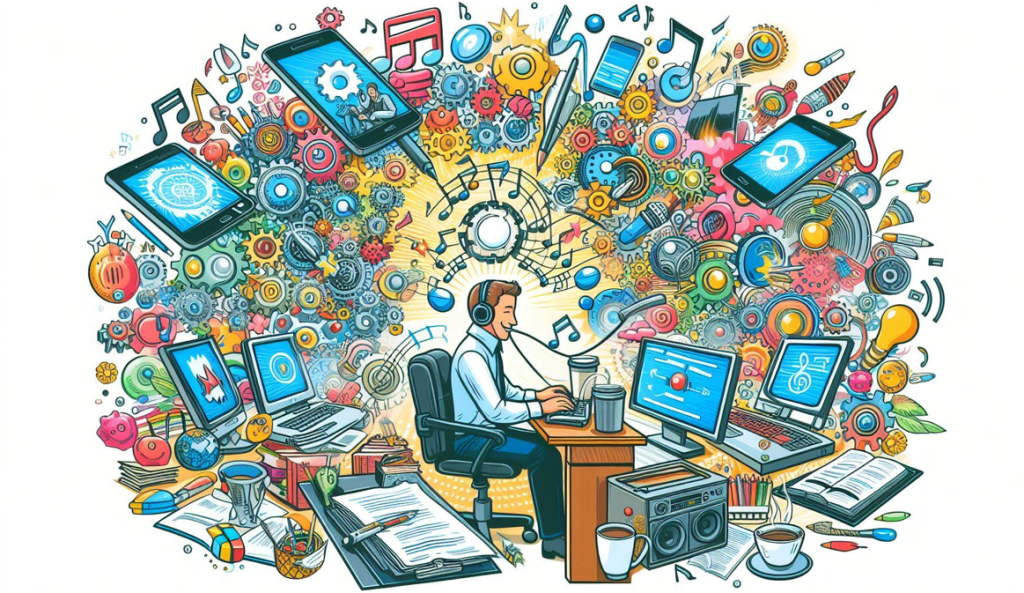The Power of Music for Focus: A Guide for Workplace Productivity

Music is an art form that has been universally treasured throughout history and in all corners of the world. Everyone has personal preferences about their favorite artist or the type of music they enjoy, some people use music to create a calm and ambient environment, and others are stimulated by music such as heavy metal or dance. With all this to consider, It is quite intriguing to ask can music enhance office productivity in the modern workplace?
Many people find music creates a calming atmosphere, a relaxing sound stage that gives the listener room to focus and concentrate on the task at hand. Others find music a terrible distraction, something that interrupts their workflow and is a nuisance to concentration. It depends on the type of person and, no doubt, the type of music being listened to.
How Does Music Improve Productivity?
There have been numerous studies that look at the relationship between music and productivity. In 1993, Rauscher et al. conducted a famous study called “The Mozart Effect,” in which they argued that listening to Mozart sonatas for just 10 minutes increased IQ scores, lowered blood pressure, and enhanced spatial reasoning skills in test subjects.
Another study by Verica Nedelkovska suggested that music has healing properties and is one of the most effective ways to reduce anxiety and make you feel relaxed in a positive environment.
Importantly the study highlights that not all music has a productive effect on an individual’s performance and that the choice of music absolutely impacts the listener in different ways.
These studies help support the view that music does improve productivity and it offers interesting insights into the positive ways music can influence people’s work productivity.
Many people’s work environment has changed dramatically in the last 2 years as working from home has become the new normal. This dynamic has benefits regarding work-life balance, but in many households, there are countless distractions, perhaps unexpected visitors interrupting your routine or children needing your attention. Either way, it is encouraging to know that listening to the right music can help create a purposeful distraction.
How Does Music Stifle Productivity?
For many people, music can also be an unwanted distraction that stifles creativity, interrupts concentration, and even creates a negative mood.
This approach is supported by evidence collected by Threadgold et al in a study called “Background music stints creativity”. This study recognized that different types of music affect individuals in different ways, but it concluded that music was indeed a distraction and it impacted creativity.
This result might surprise you if, like me, you find music helpful for working. The study focused on three groups, one group listened to unfamiliar music, the next listened to instrumental music, and the final group listened to familiar music.
Every group was impacted regardless of the type of music being listened to and regardless of whether the music introduced a positive mood.
What Kind Of Music?
A common theme I discovered whilst researching this article was that the type of music often impacts a person’s productivity. The consensus is that classical music can boost the mood and concentration levels of the listener, but the listener must enjoy the music. This implies that music genres people enjoy and music from favorite artists can potentially improve the concentration levels of the listener.
Music Is Personal
Music can trigger an emotional response from the listener. Have you ever gotten in the car after a stressful day and blasted music the entire journey home? Music is appropriate in different scenarios. When reading a book or a journal, often silence is needed to allow the reader to absorb and retain the content.
However, paradoxically, computer programmers often comment that music blocks out all other distractions around them and helps with the flow of work. Factory workers who listen to music may get greater enjoyment out of the working day. It is clear that music is personal, and the scenario often dictates whether music is appropriate or not.
What Are The Benefits of Listening to Music for Office Productivity?
It has been proven that listening to music can help reduce stress and anxiety. It can distract us from our worries and help us manage stressful situations. Music increases productivity in many scenarios. It can improve the morale of the workforce by reducing stress and brightening everyone’s mood. Some employees may have improved concentration, and it has been suggested that music can aid memory retention.
Tips For Enhancing Office Productivity When Listening To Music
If you enjoy listening to music whilst working, here are some tips to enhance your listening pleasure:
- Keep Your Music Personal: You can do this by using headphones or earbuds. It is advisable not to use laptop speakers or Bluetooth speakers. This way, you are not interrupting people who want to work in silence.
- Use Quality Headphones at a Sensible Volume: Protecting your ears is important, especially if you listen to music for several hours a day. Invest in some good-quality headphones and use a sensible volume to protect yourself and limit the distraction to others.
- Go Wireless: Have you ever been listening to music and accidentally pulled your headphones out of the jack? Yes, me too! this can be distracting to colleagues but also saves you some embarrassment.
- Never Sing-Along: Save the karaoke for the after-work drinks; singing, humming, and tapping along to songs can be annoying for your colleagues.
- Choose the Right Music: of course, this is subjective but choosing the right music style will either help or hinder your levels of concentration.
Does Music Enhance Office Productivity
To summarize, it is very clear that music can have both good and bad connotations for work productivity. Much of it is determined by the person listening to the music, the type of music that is being played, and the scenario in which the music is being listened to. If you get this balance right, the music will help you breeze through the next task, get it wrong, and it will cause a distraction and inhibit your ability to focus to get the job done.



Recent Comments